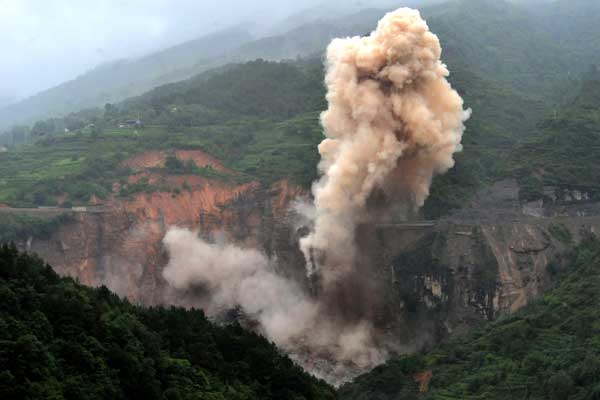Rain-lashed Sichuan suffers
 0 Comment(s)
0 Comment(s) Print
Print E-mail China Daily, July 19, 2013
E-mail China Daily, July 19, 2013
Ling Lizhou, a travel agency employee, has been bombarded with phone calls since Wednesday.
"They are not tourists who would pay for our services. Instead, they asked for compensation or postponement of their trips in response to the government's requirement that Mount Emei and the Leshan Grand Buddha be closed for two days," said Ling, who works for Chengdu Universal International Travel Service in Sichuan province.
As rainstorms were forecast to impact many parts of Sichuan from Monday evening to Thursday, the provincial meteorological bureau issued a yellow alert warning on Monday.
In the wake of the warning, the Sichuan provincial government issued an emergency circular on Tuesday afternoon, asking the administrative committee of the Mount Emei and Leshan Grand Buddha Scenic Area to close on Wednesday and Thursday.
"Some 10,000 tourists who had entered the area were asked to leave before 10 am on Wednesday in line with the circular," said Wu Jian, an official in charge of marketing for the area.
"It is the first time Mount Emei has been closed," said Wu, who has worked on Mount Emei since 1984.
Mount Emei and the Leshan Grand Buddha were included on UNESCO's World Heritage list in 1996.
"It is dangerous to take a mountainous plank road to view the Leshan Grand Buddha if there is a rainstorm. The circular was issued in the wake of the landslide in Dujiangyan," said Zhang Xudong, an official who works with Wu.
Last Wednesday, a landslide killed 43 people in Sanxi village in Dujiangyan, and 118 are still missing. Most of the dead and missing are tourists who were escaping the summer heat in the cooler mountain village.
Since the landslide, Mount Qingcheng in Dujiangyan, which is the birthplace of Chinese Taoism, has been closed. The Dujiangyan Irrigation Project — the world's oldest irrigation system still in operation — is open. But all travel agencies have stopped arranging visits to both destinations.
"Each day before the landslide, at least 20 buses with 600 tourists arranged by our agency would visit Dujiangyan and Mount Qingcheng. The landslide is a heavy blow to both travel agencies and Dujiangyan city," Ling said.







Go to Forum >>0 Comment(s)